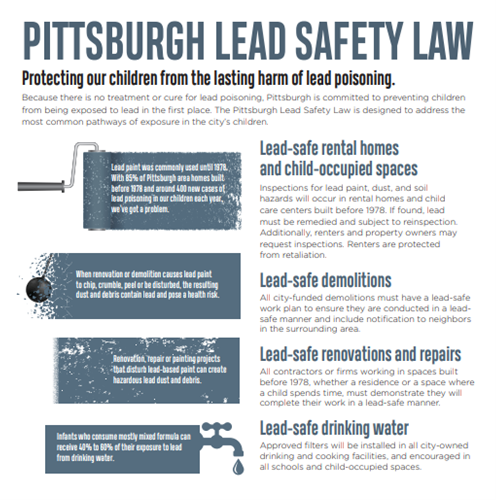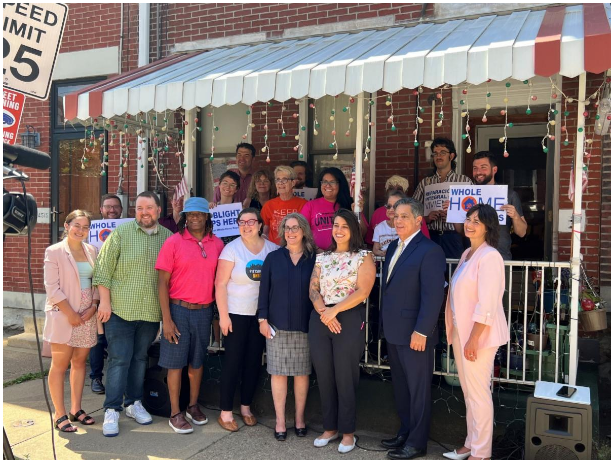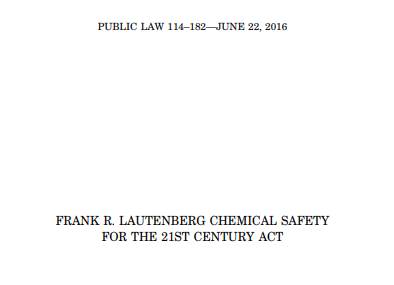
Local Level Wins
Pittsburgh Lead Safety Law
The communications awareness campaign, Get the Lead Out Pittsburgh, collaborated with Pittsburgh City Council to pass The Pittsburgh Lead Safety Law in November 2021. This comprehensive ordinance protects Pittsburgh’s children from the lasting harm of lead poisoning by addressing the most common pathways of exposure: paint, dust, soil, and water. WHE helped develop and implement this awareness campaign and proved valuable in advocating for the passage of the new law.
Council passed both a Will of Council addressing lead in water found in our schools and homes and the Pittsburgh Lead Safety Law that requires lead-safe rental homes and child-occupied spaces, lead-safe demolitions, lead-safe renovations and repairs, and lead-safe water in child-occupied city facilities.
Women for a Healthy Environment (WHE), alongside our partners Community Justice Project and Clean Water Action, championed significant updates to Article VI of the Allegheny County Health Department regulations. One of our biggest victories was the successful push to create a permanent Housing Advisory Committee—a critical step forward for tenants’ rights and healthier housing.
This committee, approved by the Allegheny County Board of Health in July 2024 and finalized by County Council in September 2024, represents a win for renters and the community at large. Modeled after existing boards, it ensures residents, public health experts, and housing providers have a permanent voice in shaping proactive solutions to housing-related health issues. Launching in January 2025, this committee will drive lasting change, addressing tenant concerns and safeguarding public health.
WHE is proud to have led this effort, securing a powerful tool for protecting tenants’ rights and fostering healthier, safer homes across the county.

State Level Wins
Pennsylvania's Whole Homes Repair Act
After months of campaigning around the effort, WHE celebrated a major win for our Healthy Homes program when the Whole Homes Repair Act was passed into law in Pennsylvania on July 9, 2022. With this act, Pennsylvania committed to putting $125 million from the American Rescue Plan into creating the Whole-Home Repairs program.
The program serves three primary purposes – 1) funding for home repairs; 2) coordination and technical assistance; and 3) workforce development. This program also provides loans and grants of up to $50,000 to homeowners and landlords whose incomes are below 80% of the area’s median income. This effort is a major win to all Pennsylvanians because it effectively expands access to healthy homes to every individual in every county in Pennsylvania, which helps alleviate the strain of housing inequities experienced throughout the state.

Federal Level Wins
Frank Lautenberg Chemical Safety for the 21st Century Act
From our inception in 2010, Women for a Healthy Environment rallied around and advocated for the passage of the Frank R. Lautenberg Chemical Safety for the 21st Century Act – and in 2016, the act finally passed! WHE was pivotal in the passage of the Act as we organized several supportive efforts over this six year time, including writing public comments, press releases, and op eds; hosting candidate forums on toxic policies with congressional candidates during the 2010 election, collaborating with safer states and safer chemicals, and supporting and participating in phone call and email campaigns to legislators.
The act has since proved key in spreading public awareness about the environmental health impact of certain chemicals, as it formally amended the primary law that provides guidelines for chemical safety, the Toxic Substances Control Act; the amendment helps allocate funding so the EPA is empowered to provide clear and enforceable deadlines for evaluating chemicals, risk-based chemical assessments, and transparency to the public about harmful chemicals.
